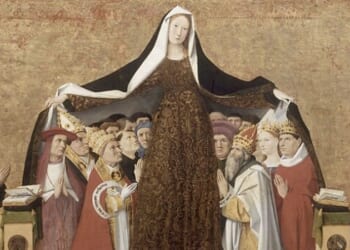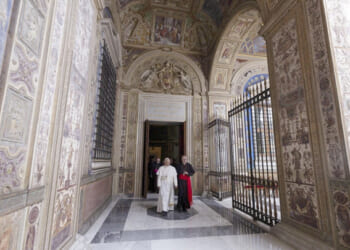“John Adams (b. 1947) is among the most celebrated composers active today.” I have quoted program notes from the Metropolitan Opera. And it is true. Who else is as celebrated as Adams? As visible (or audible, since we are talking about composers)? Philip Glass. John Williams (who is known primarily for movie music, of course).
The Met’s program notes also tell us that Adams has now had five operas staged in that house—“a feat last accomplished by Richard Strauss.”
Now playing at the Met is Adams’s Antony and Cleopatra. It premiered in San Francisco in 2022. We have had an American opera based on that Shakespeare play before—by Samuel Barber. His Antony and Cleopatra opened the “new Met,” at Lincoln Center, in 1966.
About Adams’s score, I will offer some brief observations.
It opens restless, squirmy, squiggly. It has the whiff of the ancient. Do I say that because I know this is Antony and Cleopatra? Possibly. It is hard to say.
He has a keen sense of rhythm, Adams. When he wants his rhythm straight, it is. When he wants it off-kilter—off-balance—it is. He also knows his way around the orchestra. He knows the instruments and their uses.
Trumpets and timpani suggest the military. A tuba tickles the brain (or socks it). There is plenty of zither, and harp. Strings and woodwinds do their various, versatile things.
The score has some slinky Orientalism, and a touch of jazz. To my mind, the opera has a chamber feeling. It is on a grand stage, at the Met, to be sure. Still, this opera is chamber-ish.
It is divided into two acts—not short ones. There is about two and a half hours of music. I thought of Mozart—specifically, his Così fan tutte and his Magic Flute. They are two-acters, and not short.
Adams’s Act I comes at you, relentlessly. It affords little relief. On seeing the opera, I found this act a little tedious, frankly. Act II affords relief: it is softer, lusher, friendlier. There is even what you might describe as “Romanticism.”
But it is all Adams, from beginning to end. He is not a one-note band.
When this opera ends, it ends. Without ceremony. Adams simply turns off his motor—his minimalistic motor.
At the Met, Mr. Adams is serving as conductor, as well as composer. He is a competent leader. Readers may be interested in knowing that he followed his score—looked at his score—intently.
His Antony and Cleopatra does not have a cast of thousands, but it has a sizable cast: about a dozen. Last Thursday night, when I attended, there was not a lemon in the bunch. Each singer deserves a paragraph or two. Stingily, I will address only three of the singers. Beginning with the ones in the title roles, of course.
Antony was Gerald Finley, the Canadian bass-baritone. He hardly ever puts a foot wrong—whether in song, oratorio, or opera. He did not put a foot wrong here. He was smooth, canny, and precise. Among his gifts is: English diction.
Our Cleopatra, our queen, was Julia Bullock, the American soprano. She was queenly indeed. And complicated. And alluring—alluring in her physicality, in her acting, in her singing. I think Shakespeare might have said, “Ah. Yes, that’s my Cleo.”
Caesar was Paul Appleby, the American tenor—a beautiful voice, deployed ably.
The production is in the hands of Elkhanah Pulitzer (a member of the famous publishing family). To quote our program notes, she “updates the action from the ancient world to the Golden Age of Hollywood in the 1930s.” Still, the atmosphere seemed antique, to me. When the setting was Egypt. When the setting was Rome—that was Mussolini’s time. Caesar jutted out his chin, Duce-style.
This is a smart production, whose use of video is effective: helpful rather than obtrusive.
There comes a time when Cleopatra says, or sings, “Give me my robe, put on my crown; I have immortal longings in me.” When I heard these words on Saturday night, I could not help thinking of Samuel Barber’s music—I grew up with it, so to speak. But John Adams has put his own stamp on this great play. It is a worthy, admirable stamp.


















